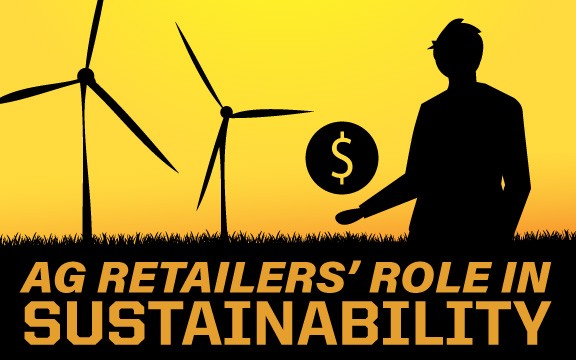Ag Retailers’ Role in Sustainability
 Authors: Dr. Lourival Carmo Monaco Neto, Postdoctoral Research Associate
Authors: Dr. Lourival Carmo Monaco Neto, Postdoctoral Research Associate
Dr. Allan W. Gray, Executive Director and Professor
Dr. Luciano Castro, International Affiliated Professor
Dr. Brady Brewer, Associate Director for Scholarship & Engagement and Assistant Professor
Sustainability is undeniably one of the most important drivers of the new business landscape created over the last few years. Its importance has been taken to an even higher level during the current pandemic, and it is a key factor in what we imagine the post-COVID world will look like.
When we talk about sustainability, we are talking about the triple bottom line, also known as the 3 Ps: People, Profit and Planet. To be sustainable, a company needs to treat its people well, achieve a profitable situation and be mindful and responsible with regard to the environment.
This is even more true and powerful in agribusiness than in most industries, as we are responsible for the production of food, energy, fiber, wood and many other fundamental resources for society. In addressing the ‘planet’ part of the three Ps, an important approach is the adoption of conservation practices on American farms.
Farmer adoption of conservation practices helps reduce the impact of agriculture on the environment. Specifically, these practices help to reduce climate change, water scarcity, land degradation, deforestation and other processes. Adoption rates for specific practices play a critical role in optimizing input usage, mitigating environmental impacts, improving soil health and reducing greenhouse gas emissions.
While farmers may have an interest in investing in the adoption of new practices, they rely on their trusted local agricultural retailer, agronomist or salesperson for information and advice on how adopting new management practices can improve their operation. Therefore, agricultural retailers and advisors farmers trust may have the ability to increase adoption rates of conservation practices by encouraging farmers and providing the information, resources and services they need.
Ultimately, ag retailers seek to serve farmer customer needs and create value they are willing to pay for. Thus, a potential challenge retailers face in influencing farmer adoption of conservation practices may be the lack of a clear value proposition and/or business model, which would allow retailers to create and capture value in assisting farmers with the adoption of these practices.
To address this topic, Purdue University’s Center for Food and Agricultural Business recently partnered with The Nature Conservancy to interview retailers and their farmer customers in order to better understand how both groups view conservation practices, their adoption, benefits, barriers and how these practices can create a business that achieves another P in sustainability — profit. Some of the most important takeaways from this research can be found here.
Beyond the Blog
Learn more about how you as an ag retailer can create value for your farmer customers at the ARA Management Academy. In the interest of safety and to eliminate the need for participant travel, the academy will be held completely online January 26-28, 2021. You’ll have the opportunity to develop your management skill set and sharpen your leadership and decision-making capabilities through managerial courses chosen specifically to meet the needs of managers in the ag retail industry.
Tags: Ag Retailers, Agriculture, ARA Management Academy, Conservation, Food, Sustainability
RELATED POSTS:
Optimizing Sales Management: Knowledge, Coaching and Continuous Improvement
While we used to think that exceptional salespeople possessed an innate gift, recent data suggests the impact of today’s sales managers in nurturing and refining this gift to unlock its fullest potential.
A great moment for value-based sales in agribusiness
Value-based sales can empower companies to craft compelling value propositions, understand the customer’s business model and effectively communicate to stakeholders.
How can big data empower the development of new products?
Data is one of the most powerful resources for a company. It enables accurate decision-making and minimizes risk, ensuring greater revenue and sustainable growth.
